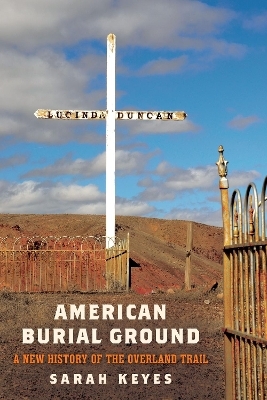
American Burial Ground
A New History of the Overland Trail
Seiten
2023
University of Pennsylvania Press (Verlag)
978-1-5128-2451-3 (ISBN)
University of Pennsylvania Press (Verlag)
978-1-5128-2451-3 (ISBN)
In popular mythology, the Overland Trail is typically a triumphant tale, with plucky easterners crossing the Plains in caravans of covered wagons. But not everyone reached Oregon and California. Some 6,600 migrants perished along the way and were buried where they fell, often on Indigenous land. As historian Sarah Keyes illuminates, their graves ultimately became the seeds of U.S. expansion.
By the 1850s, cholera epidemics, ordinary diseases, and violence had remade the Trail into an American burial ground that imbued migrant deaths with symbolic power. In subsequent decades, U.S. officials and citizens leveraged Trail graves to claim Native ground. Meanwhile, Indigenous peoples pointed to their own sacred burial grounds to dispute these same claims and maintain their land. These efforts built on anti-removal campaigns of the 1820s and 30s, which had established the link between death and territorial claims on which the significance of the Overland Trail came to rest.
In placing death at the center of the history of the Overland Trail, American Burial Ground offers a sweeping and long overdue reinterpretation of this historic touchstone. In this telling, westward migration was a harrowing journey weighed down by the demands of caring for the sick and dying. From a tale of triumph comes one of struggle, defined as much by Indigenous peoples’ actions as it was by white expansion. And, finally, from a migration to the Pacific emerges instead a trail of graves. Graves that ultimately undergirded Native dispossession.
By the 1850s, cholera epidemics, ordinary diseases, and violence had remade the Trail into an American burial ground that imbued migrant deaths with symbolic power. In subsequent decades, U.S. officials and citizens leveraged Trail graves to claim Native ground. Meanwhile, Indigenous peoples pointed to their own sacred burial grounds to dispute these same claims and maintain their land. These efforts built on anti-removal campaigns of the 1820s and 30s, which had established the link between death and territorial claims on which the significance of the Overland Trail came to rest.
In placing death at the center of the history of the Overland Trail, American Burial Ground offers a sweeping and long overdue reinterpretation of this historic touchstone. In this telling, westward migration was a harrowing journey weighed down by the demands of caring for the sick and dying. From a tale of triumph comes one of struggle, defined as much by Indigenous peoples’ actions as it was by white expansion. And, finally, from a migration to the Pacific emerges instead a trail of graves. Graves that ultimately undergirded Native dispossession.
Sarah Keyes is Assistant Professor of History at the University of Nevada, Reno.
| Erscheinungsdatum | 09.10.2023 |
|---|---|
| Reihe/Serie | America in the Nineteenth Century |
| Zusatzinfo | 7 b/w photos, 5 maps |
| Verlagsort | Pennsylvania |
| Sprache | englisch |
| Maße | 152 x 229 mm |
| Themenwelt | Geisteswissenschaften ► Geschichte ► Regional- / Ländergeschichte |
| Geschichte ► Teilgebiete der Geschichte ► Kulturgeschichte | |
| ISBN-10 | 1-5128-2451-8 / 1512824518 |
| ISBN-13 | 978-1-5128-2451-3 / 9781512824513 |
| Zustand | Neuware |
| Haben Sie eine Frage zum Produkt? |
Mehr entdecken
aus dem Bereich
aus dem Bereich
der stille Abschied vom bäuerlichen Leben in Deutschland
Buch | Hardcover (2023)
C.H.Beck (Verlag)
CHF 32,15
vom Mittelalter bis zur Gegenwart
Buch | Softcover (2024)
C.H.Beck (Verlag)
CHF 16,80
eine Geschichte der Welt in 99 Obsessionen
Buch | Hardcover (2023)
Klett-Cotta (Verlag)
CHF 34,90


